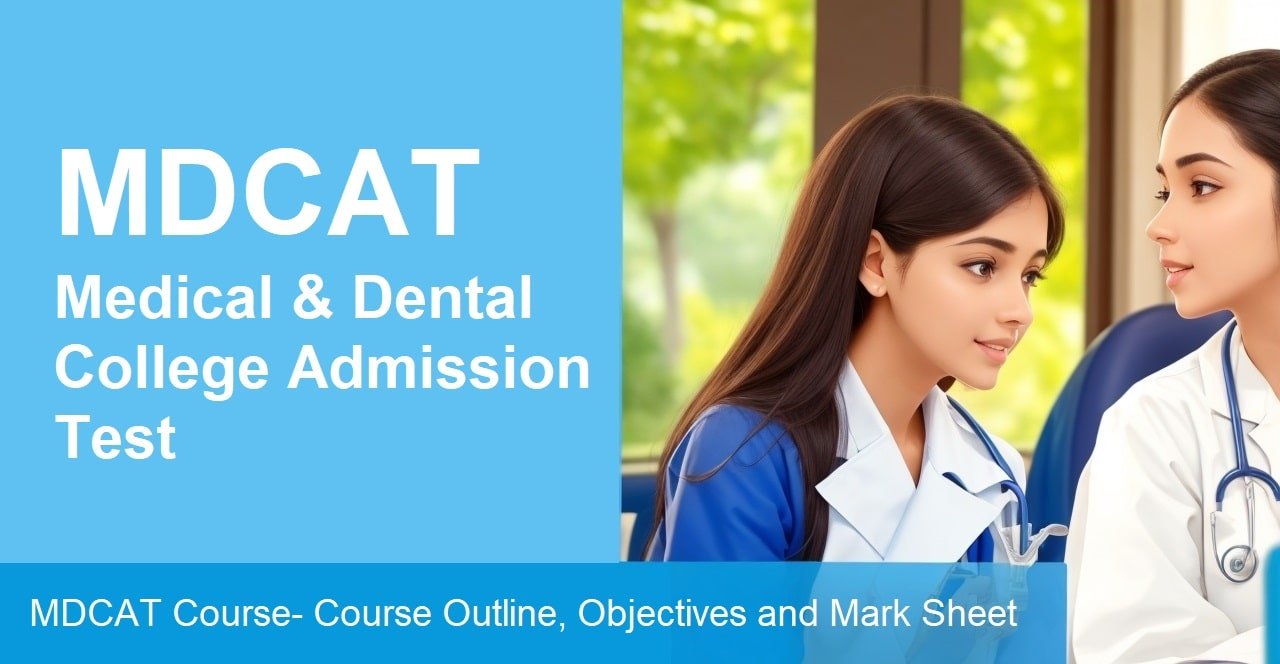
The Medical and Dental College Admission Test (MDCAT) is an annual paper-based exam held in Pakistan and around the world for students interested in pursuing undergraduate medical and dentistry education in Pakistan. It is a requirement for admission to all medical and dental colleges in Pakistan (both public and private).
Must read before PMDC_Act_2022.pdf
Who conducted MDCAT?
The Pakistan Medical and Dental Council holds MDCAT every year. The test will replace the previous provincial medical admission exams in 2020. However, after the dissolution of PMC in 2023, the examination will be moved to the provincial level, with each province deciding which university would administer the MDCAT exam.
Medical and Dental College Admission Test (MDCAT): A Project-Based Approach
Students will complete a comprehensive project that demonstrates their understanding and application of key concepts covered in the MDCAT 01, specifically in the biological, chemical, and critical analysis and reasoning skills domains.
MDCAT Marks Distribution 2023
For the year 2023, the Pakistan Medical Council (PMC) has announced several key points regarding the MDCAT:
- The total marks for the National MDCAT are 200.
- There is no negative marking in the test.
- The syllabus is uniform across all provinces.
- Passing the MDCAT is a requirement for applying to nearly 150 medical colleges.
- Candidates must have a minimum of 70% in F.Sc and secure at least 60% in the NMDCAT.
- The eligibility for admission is pegged at a minimum of 70% aggregate marks in the test.
The MDCAT MCQ distribution for 2023 is structured as follows:
- Biology: 68 MCQs
- Chemistry: 56 MCQs
- Physics: 56 MCQs
- English: 20 MCQs
- Logical Reasoning: 10 MCQs
Biology holds the highest weightage, with topics ranging from cell structure to evolution. Chemistry and Physics follow, with emphasis on core concepts like electrostatics and thermodynamics. The English portion tests language proficiency through synonyms, antonyms, sentence structure, and completion.
MDCAT Syllabus
Module 1: Understanding Biological Systems
- Lesson Plan: Introduction to Cellular Biology
- Learning Objectives:
- Describe cell structure and function.
- Explain cellular metabolism and energy transformation.
- Real World Example: Investigating a case of mitochondrial disease.
- Activities:
- Step-by-step lab simulation of cellular respiration.
- Class discussion on the implications of cellular diseases.
- Discussion Questions:
- How do cellular malfunctions contribute to disease?
- What are potential treatments for mitochondrial diseases?
- Video Script: Explaining how cellular biology is foundational for understanding diseases, relating to the final project on medical case analysis.
- Learning Objectives:
Module 2: Chemical Foundations
- Lesson Plan: Basics of Organic Chemistry
- Learning Objectives:
- Identify organic compounds essential for life.
- Understand chemical reactions in metabolic pathways.
- Real World Example: Drug composition and its metabolic impact.
- Activities:
- Step-by-step creation of a metabolic pathway poster.
- Group discussion on the importance of organic chemistry in pharmacology.
- Discussion Questions:
- What role do organic compounds play in medicine?
- How does drug design rely on principles of organic chemistry?
- Video Script: Discussing the link between organic chemistry and the pharmacological aspects of the final project.
- Learning Objectives:
Module 3: Human Physiology and Health
- Lesson Plan: Cardiovascular and Respiratory Systems
- Learning Objectives:
- Explain the function of the cardiovascular and respiratory systems.
- Analyze health scenarios related to these systems.
- Real World Example: A case study of a patient with COPD.
- Activities:
- Step-by-step analysis of a patient’s cardiovascular health data.
- Debate on the most effective treatments for COPD.
- Discussion Questions:
- What are the latest treatments for cardiovascular diseases?
- How do lifestyle choices affect these two systems?
- Video Script: Tying cardiovascular and respiratory health to the patient case studies in the final project.
- Learning Objectives:
Module 4: Critical Analysis and Reasoning Skills
- Lesson Plan: Analytical Thinking in Medicine
- Learning Objectives:
- Develop critical thinking and problem-solving skills.
- Evaluate medical research and data.
- Real-World Example: Reviewing clinical trial data for a new medication.
- Activities:
- Step-by-step critique of a published medical study.
- Group discussion on the ethical considerations in medical research.
- Discussion Questions:
- How does critical analysis impact patient care?
- What are the challenges in interpreting clinical data?
- Video Script: Highlighting the importance of critical analysis in developing the research component of the final project.
- Learning Objectives:
Module 5: Societal Implications in Medicine
- Lesson Plan: Public Health and Policy
- Learning Objectives:
- Understand the impact of societal issues on health.
- Analyze health policy and its implications.
- Real World Example: The opioid crisis and healthcare policy.
- Activities:
- Step-by-step development of a public health campaign proposal.
- Role-playing exercise as policymakers discussing health issues.
- Discussion Questions:
- How do public health policies shape patient outcomes?
- What is the role of a physician in shaping health policy?
- Video Script: Connecting public health issues to the policy analysis section of the final project.
- Learning Objectives:
Module 6: Application and Synthesis
Lesson Plan: Integrating MDCAT Knowledge in Clinical Scenarios
- Learning Objectives:
- Synthesize knowledge from previous modules.
- Apply critical thinking to clinical case scenarios.
- Real World Example: Collaborative diagnosis of a complex patient case.
- Activities:
- Step-by-step creation of a case report for a hypothetical patient.
- Peer review sessions to discuss and refine case reports.
- Discussion Questions:
- How do all the MDCAT subjects integrate into a real-world medical scenario? – What are the challenges in diagnosing a patient with multiple health issues?
- Video Script: Discuss how the integration of MDCAT subjects is crucial in real-life medical scenarios, directly relating to the creation of a comprehensive final project.
View Syllabus.pdf
Final Project: Comprehensive Medical Case Analysis
- Project Plan Description:
- Students will receive a hypothetical patient’s case, complete with medical history, symptoms, and initial test results.
- They will be required to use knowledge from all modules to diagnose the patient, propose potential treatments, and consider the implications of their treatment plan from a societal and ethical standpoint.
- The project will culminate in a detailed case report and an oral presentation defending their medical decisions.
Project Components:
- Patient History and Symptoms Log: Documenting and understanding the patient’s background.
- Diagnostic Tests Analysis: Interpreting lab results and imaging to inform the diagnosis.
- Treatment Plan: Outlining potential treatments based on current medical guidelines and research.
- Societal Impact Assessment: Evaluating the broader implications of the patient’s condition and treatment on society.
- Ethical Considerations: Addressing any ethical dilemmas encountered during the diagnosis and treatment process.
- Oral Presentation: A comprehensive defense of their medical decisions, showcasing their ability to communicate complex medical information clearly and effectively.




